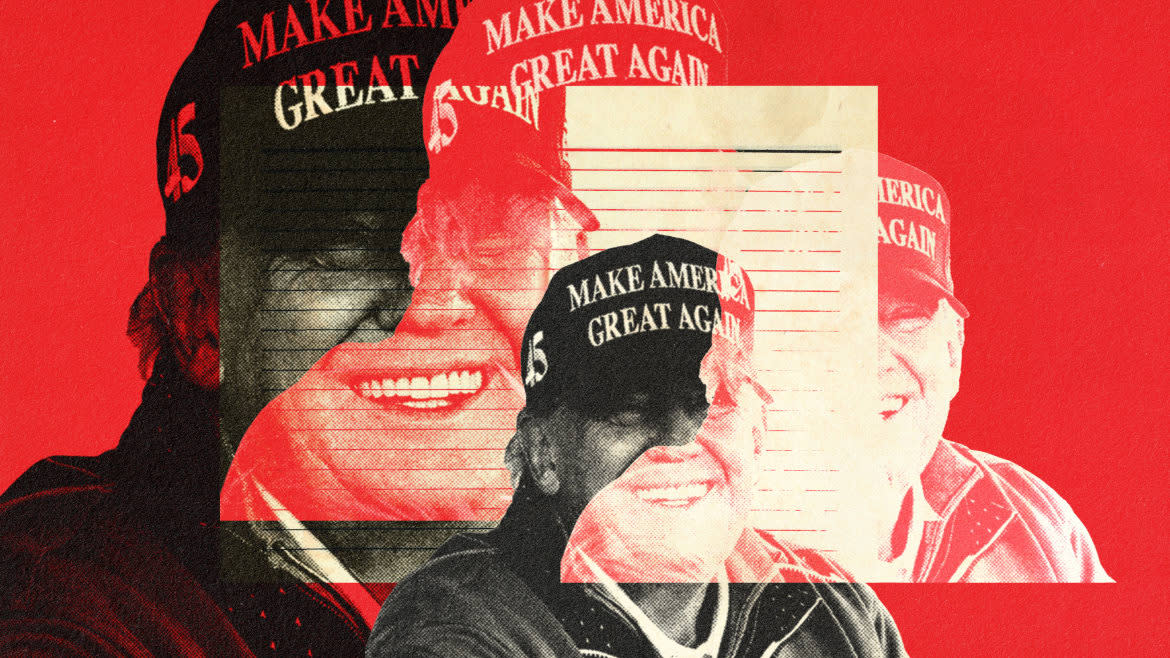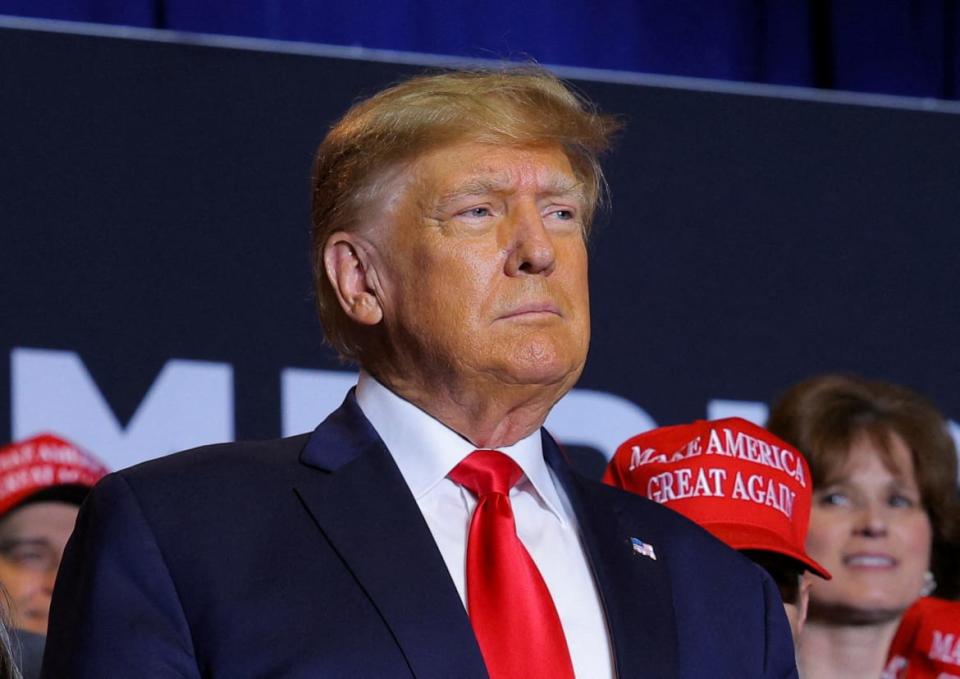Trump’s New Ploy to Knock the Manhattan DA’s Case Down to Misdemeanors

- Oops!Something went wrong.Please try again later.
- Oops!Something went wrong.Please try again later.
When the Manhattan District Attorney finally indicted former President Donald Trump in March, Alvin Bragg made the curious decision to not detail Trump’s crimes in the official indictment—something critics seized on almost immediately to say this was an overblown case.
While previous investigators had wrestled with how to charge Trump with felonies, Bragg overcame that hurdle by essentially charging Trump with 34 misdemeanor counts of faking business records—then leveling them up to felonies in a parallel legal document. Under New York law, faking business records is only a felony if it’s done while committing another crime. In this case, prosecutors say Trump hid his 2016 porn star hush money payment in order to break election laws, therefore the 34 counts of taking business records become felonies.
But according to a source familiar with the Trump legal team’s internal discussions, the former president’s lawyers are now exploring how to use that otherwise ingenious move as a weakness to severely power down the case. And Trump’s lawyers believe their new tactic could force the DA to reconsider if this is a fight worth having.
Their legal strategy all comes down to a Supreme Court case where a white guy in New Jersey got drunk and shot at a Black family’s home in 1994—and then managed to get hate crime charges overturned.
Trump’s lawyers are eyeing the 2000 SCOTUS decision Apprendi v. New Jersey, which stressed the importance of putting in an indictment all the aspects of a crime that could enhance penalties.
In the Apprendi case, a state judge unilaterally determined that Charles C. Apprendi Jr. was motivated by racial bias when he decided to scare his neighbors. The judge gave him 12 years in prison instead of the 10-year maximum sentence he would have gotten from the charges originally listed in the indictment. But the Supreme Court intervened halfway through his sentence and went as far as overturning New Jersey’s hate crime law. The justices noted that the nation’s founders never really considered the modern justice system’s practice of considering “elements” of a felony or “sentencing factors,” because traditionally, the basic facts of a case remained the same from indictment to trial.

In other words: if it’s not in the indictment, it can’t be used to tack on any extra jail time.
According to a person with intimate knowledge of the DA’s previous versions of this Trump investigation, the Trump team has a “creative” approach that zeroes in on real flaws in the DA’s present case—even if it ultimately doesn’t work.
A preview of this battle is already playing out in court, as the DA’s office on Tuesday defended its decision to leave important stuff out of the Trump indictment. But the fight that may soon unfold could take the wind out of the DA’s sails.
On April 27, Trump’s lawyers formally asked the Manhattan DA to submit a detailed explanation of exactly what crimes Trump actually committed.
“Describe the substance of Donald J. Trump’s conduct,” defense attorney Susan Necheles wrote.
“Specify the criminal statute… which Donald J. Trump is alleged to have committed or intended to commit to aid or conceal the commission thereof,” she added, asking prosecutors to define how exactly Trump broke New York’s election laws.
On Tuesday, Bragg’s office responded in a 10-page court filing that largely shut them down, repeatedly saying that Trump “is not entitled to the information.”
“Where an intent to commit or conceal another crime is an element of an offense, the People need not prove intent to commit or conceal a particular crime,” prosecutor Becky Mangold wrote, specifically noting that “the indictment need not identify any particular crime that the defendant intended to commit or conceal.”
The Storm Arrives: NYC Grand Jury Indicts Donald Trump
Bragg’s office refused to explain why prosecutors decided not to add the alleged election violation in the indictment, allowing Tuesday’s court filing to speak for itself.
But the vagueness in the indictment is not a minor issue. Figuring out how to supercharge the otherwise trite misdemeanor charge for faking business records was a major feat for the Manhattan DA’s office—and the secondary charge issue was critical to upgrading these misdemeanors into felonies.
A tell-all memoir by a former prosecutor on the Manhattan DA’s team, Mark Pomerantz, gives an incredibly detailed account of how difficult it was for the DA’s office to bring this particular case, which they dubbed “the zombie case.” In People vs. Donald Trump, Pomerantz explains how he racked his brain to come up with a way that would convert Trump’s deceitful documents into a felony.
“They did not amount to much in legal terms… creating false business records is only a misdemeanor under New York law,” Pomerantz wrote. “Falsifying business records can be prosecuted as a felony if the defendant created the records intending to commit or conceal ‘another crime.’ This statutory language, however, is ambiguous. Does the reference to ‘another crime’ include federal crimes, or just state crimes?”
When Trump was arraigned in criminal court in April, his defense lawyer Joe Tacopina assured reporters this case would “never” make it to trial. And the Trump team’s new potential tactic threatens to downgrade the severity of the case before it ever reaches a jury, which could force the DA to consider whether a case full of misdemeanors justifies an expensive prosecution.
The legal precedent Trump’s team is considering is also buttressed by a 1999 Supreme Court decision, Jones v United States, which decided that “any fact other than prior conviction that increases the maximum penalty for a crime must be charged in an indictment, submitted to a jury, and proved beyond a reasonable doubt.”
If Trump’s team successfully uses that defense strategy, it would be an embarrassing defeat for Bragg, who could have just as easily put all the information about the case that was included in the “Statement of Facts” in the indictment and avoided this whole mess.
Bragg’s historic criminal case—the first of its kind against a former American president—largely rests on the idea that Trump faked mountains of business records when he directed his lawyer to pay off a porn star to keep quiet about his brief sexual affair with her. That ex-lawyer, Michael Cohen, and the porn star, Stormy Daniels, are now key witnesses in the Manhattan DA’s case. (The case itself is focused on the long trail of dubious payment records that were designed to hide the hush money payments, which include nearly a dozen invoices for “legal services” that were really just Trump paying Cohen back for fronting the cash to Stormy Daniels.)
The idea—that formal accusations should be pretty clearly laid out in an indictment—isn’t exactly new. It dates back roughly half a millennium, appearing even in a 1678 British treatise called Hale’s Pleas of the Crown that lays out how any law that brings “a higher degree of punishment” for a crime “must expressly charge it” in an indictment with “certainty and precision.”
DA’s Secret Weapon May Be Lawyer Who’s Dogged Trump for Years
So it was notable when the DA’s office unveiled the Trump indictment in March and effectively sidestepped the entire issue of how these misdemeanors were felonies. Bragg was simply accusing the former president of violating New York’s election laws—and putting all of those details in the “Statement of Facts.”
But as much hope as the Trump team seems to be putting in this legal gambit, it may not work.
Karen Friedman Agnifilo, an attorney who served as the chief assistant to the previous DA who started the Trump investigation, said it’s actually routine for Manhattan prosecutors to keep the indictment simple and leave out the nuts and bolts of the crime.
“I’m not at all surprised… it would never be in the indictment. There are plenty of instances where there are bump-up crimes” outside the official indictment, she said. “To me, it doesn’t seem like it’s an issue. And I don’t even think they had to lay out a statement of facts. Nothing requires that. That’s not always done either.”
Agnifilo likened this situation to the way Manhattan prosecutors regularly charge burglars with “trespassing” but leave details about the actual intended theft outside the indictment. The reasoning, she explained, is that including something in the indictment forces prosecutors to beef up their case.
“That’s just one more thing you have to prove. Maybe they don’t know they can’t prove it beyond a reasonable doubt,” she said.
Still, that raises an important question: If Manhattan prosecutors can’t prove that Trump committed an election crime, doesn’t that hint at a weak case?
To that, Agnifilo noted she wished prosecutors included at least one election-related criminal charge against Trump in the indictment: engaging in a conspiracy to meddle in an election unlawfully. If they had, prosecutors would automatically be able to include at trial evidence about Trump’s attempts to suppress Stormy Daniels’ story and silence a doorman who claimed Trump had fathered an illegitimate child. But now that prosecutors left it out of the indictment, prosecutors will have to argue in court to make this key evidence part of their case at trial.
“I think the reason they didn’t charge conspiracy is because it’s a misdemeanor too, and they don’t want to compromise,” she said. “They don’t want a misdemeanor.”
Get the Daily Beast's biggest scoops and scandals delivered right to your inbox. Sign up now.
Stay informed and gain unlimited access to the Daily Beast's unmatched reporting. Subscribe now.

